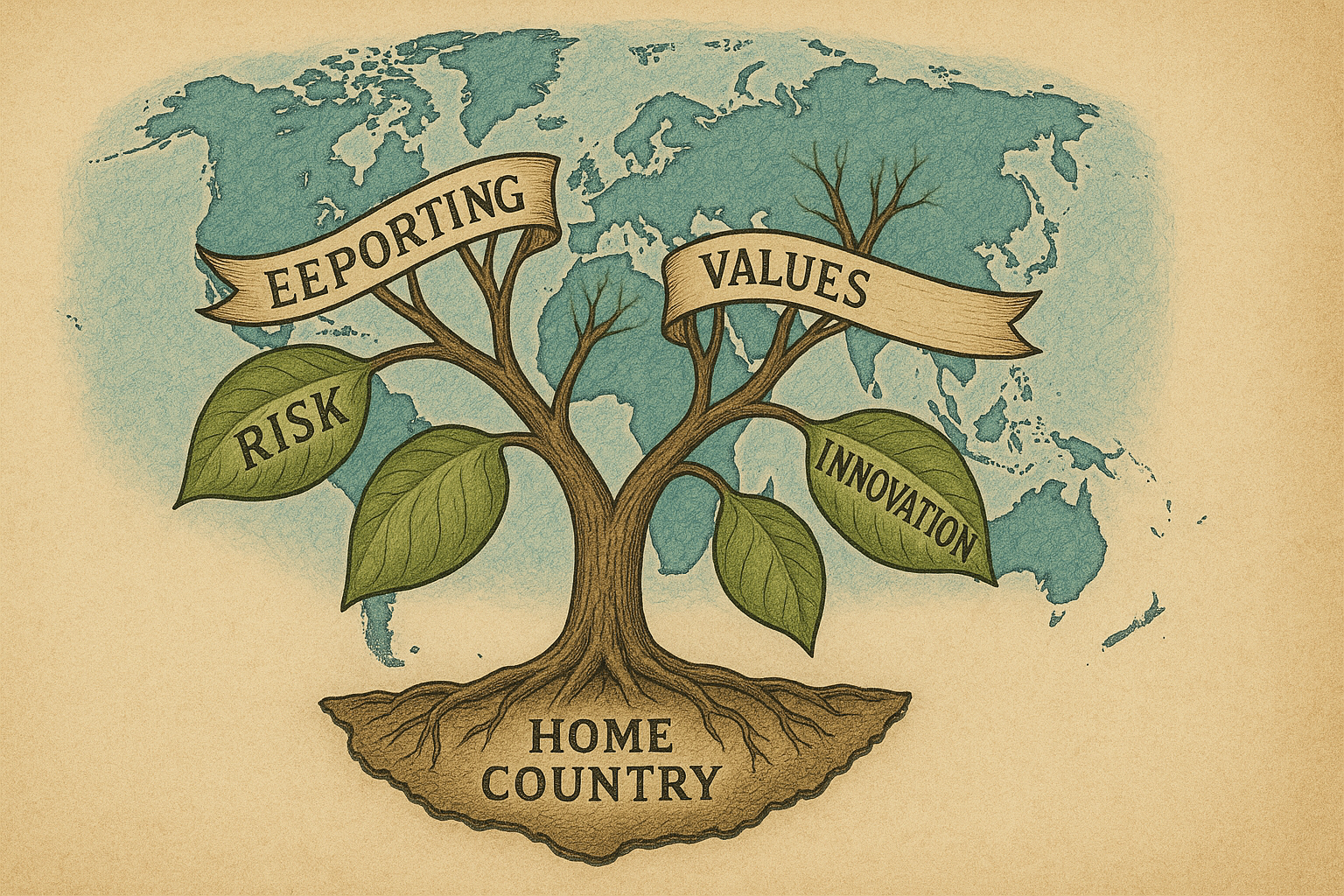Can family firms go global without losing their roots?
Massimo Baù, Joern Block, Allan Discua Cruz, Lucia Naldi
Audio > Play / Stop
CeFEO's Authors
CeFEO counts more than 50 scholars and 30 affiliated researchers. Several studies and reports have consistently identified CeFEO as a leading research environment worldwide in the area of ownership and family business studies.
This research project, has been co-authored by the following CeFEO Members.
Reference
Spotlight highlights research-based findings only. If you’re interested in exploring this project further or delving into the theoretical and methodological details, we encourage you to contact the authors or read the full article for a comprehensive understanding.

Baù, M., Block, J., Discua Cruz, A., & Naldi, L. (2021). Bridging locality and internationalization – A research agenda on the sustainable development of family firms. Entrepreneurship & Regional Development, 33(7–8), 477–492.
https://doi.org/10.1080/08985626.2021.1925846

What is Spotlight?
Spotlight is an innovative online family business magazine designed to bridge the gap between cutting-edge research and the real-world needs of practitioners, owners, and policymakers. Drawing on the latest findings from the Centre for Family Entrepreneurship and Ownership (CeFEO) at Jönköping International Business School, Spotlight delivers insightful, accessible summaries of key research topics. Our mission is to keep the family business community informed and empowered by offering actionable insights, expert analyses, and forward-thinking strategies that enhance business leadership and ownership practices for long-term success.

This article is brought to you by the WIFU Foundation
Spotlight is generously supported by the WIFU Foundation, which promotes research, education, and dialogue in the field of family business. This partnership enables us to continue bridging academic insights and real-world practice for the advancement of responsible family entrepreneurship and ownership.
How do family firms navigate global opportunities without losing their local soul?
Family businesses are everywhere—and they matter. They are rooted in their communities, driven by long-term visions, and uniquely positioned to promote both economic performance and social responsibility. But in a world that’s rapidly globalizing, how can these firms stay grounded while also scaling? This article unpacks a forward-looking research agenda exploring how family firms can navigate the tension between local embeddedness and international expansion—all while supporting sustainable development. Whether you're an owner, policymaker, or researcher, there are powerful lessons here on what it means to lead across generations and geographies.
Family businesses are everywhere—and they matter. They are rooted in their communities, driven by long-term visions, and uniquely positioned to promote both economic performance and social responsibility. But in a world that’s rapidly globalizing, how can these firms stay grounded while also scaling? This article unpacks a forward-looking research agenda exploring how family firms can navigate the tension between local embeddedness and international expansion—all while supporting sustainable development. Whether you're an owner, policymaker, or researcher, there are powerful lessons here on what it means to lead across generations and geographies.
The world is more connected—and more divided—than ever before. Digital technologies and globalization have opened up unprecedented opportunities for businesses of all kinds. At the same time, rising inequality, political fragmentation, and environmental crises pose daunting challenges. Family businesses, which make up the majority of enterprises globally, stand at the crossroads of these changes.
Unlike large multinationals that often operate as "stateless" actors, family firms tend to remain deeply embedded in their local contexts. They care about their communities, their employees, and their legacies. Yet, many are also increasingly drawn toward international markets. This creates a strategic—and emotional—tension: how to grow outward without growing apart from one’s roots?
In their editorial for a special issue of Entrepreneurship & Regional Development, Massimo Baù, Joern Block, Allan Discua Cruz, and Lucia Naldi tackle this very issue. By reviewing and synthesizing recent studies, they offer a comprehensive research agenda on how family firms can bridge locality and internationalization while advancing sustainable development.
What We Studied
This editorial synthesizes findings from five articles selected for a special issue dedicated to the theme of “Locality and Internationalization of Family Firms.” The authors bring together a rich mix of case studies, quantitative analyses, and theoretical models to explore how family businesses manage the interplay between local ties and global ambitions.
Beyond summarizing these contributions, Baù and colleagues propose a conceptual framework outlining how family firms engage with both local and global environments. They also identify key contingent factors—such as governance quality, authenticity, and sustainability orientation—that influence how family firms navigate this duality.
Key Insights
1. Family Firms as Community Anchors and Global Actors
Family businesses don’t just operate in a place—they are of the place. They fund local schools, sponsor sports teams, and preserve regional traditions. Yet, many also export products, build international networks, and pursue growth across borders. Their ability to “act locally and think globally” positions them uniquely to support sustainable development goals (SDGs) that require integrated, cross-scale solutions.
2. Local Embeddedness: A Double-Edged Sword
Strong local roots can yield trust, brand authenticity, and employee loyalty. But they can also lead to overembeddedness—where loyalty to local customs or governance norms stifles innovation and adaptability. One study in the issue shows that in industrial districts, heavy family involvement in governance can actually dampen firm performance in high-tech sectors.
3. Internationalization with Integrity
Rather than shedding their identity, successful family firms internationalize by amplifying it. They market their authenticity, heritage, and values abroad. A multiple case study shows that authenticity-driven strategies—like preserving family narratives and emphasizing artisanal traditions—can actually strengthen international positioning, especially when accompanied by intentional strategies like integration and value evangelization.
4. The Role of Institutions and Regions
Place matters. One study reveals that family firms are more prevalent in regions with weaker institutions, where their embeddedness allows them to fill governance or trust gaps. In contrast, strong institutional environments can provide the scaffolding needed for global expansion. This highlights the importance of regional policy in shaping the sustainability and competitiveness of family firms.
5. Sustainability as an Inherited Value
Family firms often engage in sustainability practices—not just for public relations, but as a means of preserving their legacy. Their long-term orientation, intertwined family-business goals, and intergenerational perspective align closely with the SDGs. Practices like local philanthropy, environmental stewardship, and workforce stability reflect a deeper commitment to continuity and community.
Takeaways
For Family Business Leaders
- Rooted but Responsive: Leverage your local roots as a competitive asset, but remain flexible in the face of global change.
- Authenticity as Strategy: Don’t dilute your identity when going global—embrace it. Tell your story, share your heritage, and use authenticity as a market differentiator.
- Embed Sustainability: Make sustainability a strategic priority, not a side project. Align your business practices with the values you want to pass on.
For Policymakers
- Support Embedded Globalization: Create enabling environments that allow family firms to thrive locally while expanding globally—through infrastructure, education, and institutional support.
- Leverage Family Firms for Regional Development: Recognize and invest in family firms as stabilizers of local economies, especially in underserved or rural areas.
For Researchers and Educators
- Dig into Context: Explore how different regional, institutional, and cultural contexts shape family firm behavior.
- Bridge Theory and Practice: Collaborate with family businesses to develop actionable models that reflect their unique needs and dynamics.
- Educate the Next Generation: Equip future leaders with the skills to manage complex identity tensions across generations and borders.
Impact
The editorial doesn’t just frame a scholarly debate—it lays the groundwork for a more inclusive and sustainable global economy. By positioning family firms as vital connectors between local well-being and global prosperity, the authors offer a compelling case for renewed attention and investment in this sector. Their model suggests that achieving the SDGs will require not only innovation and scale but also groundedness, authenticity, and a long-term perspective—qualities family firms have in abundance.
Recommendations
- Create a Sustainability Pledge: Encourage family businesses to adopt tools like the Family Business for Sustainable Development (FBSD) pledge and sustainability indicators.
- Develop Hybrid Strategies: Design strategies that integrate local identity with international adaptability, such as dual branding or local-global product lines.
- Policy Innovation: Encourage governments to recognize family firms as developmental assets, providing targeted support for their dual-locality strategies.
- Collaborative Research Platforms: Build stronger bridges between academia and business practice by supporting living labs, case studies, and participatory research methods.

CeFEO's Authors
CeFEO counts more than 50 scholars and 30 affiliated researchers. Several studies and reports have consistently identified CeFEO as a leading research environment worldwide in the area of ownership and family business studies. This research project, has been co-authored by the following CeFEO Members.
Reference
Spotlight highlights research-based findings only. If you’re interested in exploring this project further or delving into the theoretical and methodological details, we encourage you to contact the authors or read the full article for a comprehensive understanding.

Baù, M., Block, J., Discua Cruz, A., & Naldi, L. (2021). Bridging locality and internationalization – A research agenda on the sustainable development of family firms. Entrepreneurship & Regional Development, 33(7–8), 477–492.
https://doi.org/10.1080/08985626.2021.1925846

What is Spotlight?
Spotlight is an innovative, AI-powered, online family business magazine designed to bridge the gap between cutting-edge research and the real-world needs of practitioners, owners, and policymakers. Drawing on the latest findings from the Centre for Family Entrepreneurship and Ownership (CeFEO) at Jönköping International Business School, Spotlight delivers insightful, accessible summaries of key research topics. Our mission is to keep the family business community informed and empowered by offering actionable insights, expert analyses, and forward-thinking strategies that enhance business leadership and ownership practices for long-term success.

This article is brought to you by the WIFU Foundation
Spotlight is generously supported by the WIFU Foundation, which promotes research, education, and dialogue in the field of family business. This partnership enables us to continue bridging academic insights and real-world practice for the advancement of responsible family entrepreneurship and ownership.











